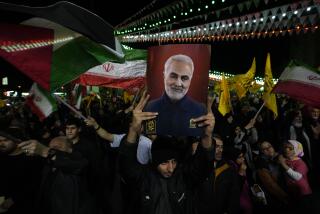U.S. hits Syria, Iran with sanctions for Internet, tech abuses
WASHINGTON -- The Obama administration took aim Monday at what it called “digital guns for hire,” unveiling new sanctions against Syria and Iran for using the Internet, social media and other technology to track and target dissidents.
The governments of those countries and some telecommunications companies working with them have used technology to “facilitate grave human rights abuses,” the administration said.
“These technologies should be in place to empower citizens, not to repress them,” President Obama said in announcing the sanctions at a speech at the U.S. Holocaust Memorial Museum.
In its international cyberspace strategy released last year, administration officials said they “encourage people all over the world to use digital media ... and denounce those who harass, unfairly arrest, threaten, or commit violent acts against the people who use these technologies.”
The Internet and social media played a pivotal role in the pro-democracy uprisings of last year’s Arab Spring, which led to the toppling of repressive regimes in Egypt, Libya and other countries.
The administration said the Syrian government had directed Syriatel, a privately owned telecommunications company that controls 55% of that nation’s cellphone market, to cut off network access in areas where the government planned attacks on rebels. The company also recorded mobile phone calls on the government’s behalf, the administration said.
Datak Telecom, an Internet service provider in Iran, collaborated with the government there to monitor, track and target people who tried to get around the regime’s blocking of Internet content, the administration said.
Datak also assisted in surveillance of Iranians who used a popular commercial email service, and planned to expand the operation to potentially include millions of Iranian Internet users, according to the White House.
The administration targeted those companies, along with Syrian and Iranian government agencies and people who directed the surveillance operations, for financial sanctions and bans on U.S. visas. One person specifically named was Ali Mamluk, who the administration said oversaw a communications program by the Syrian General Intelligence Directorate that was directed at opposition groups.
Mamluk worked with Iran’s Ministry of Intelligence and Security to provide the Syrian government with training in the use of Internet monitoring technology, the administration said. He also requested Iran’s help with monitoring social networks, it said.
The Syrian General Intelligence Directorate has been implicated in serious human rights abuses, such as arbitrary arrests and the death of detainees, the administration said.
RELATED:
U.N. approves full monitoring mission in Syria
Twitter’s new censorship plan stirs global furor
Iran, world powers agree to further nuclear talks







